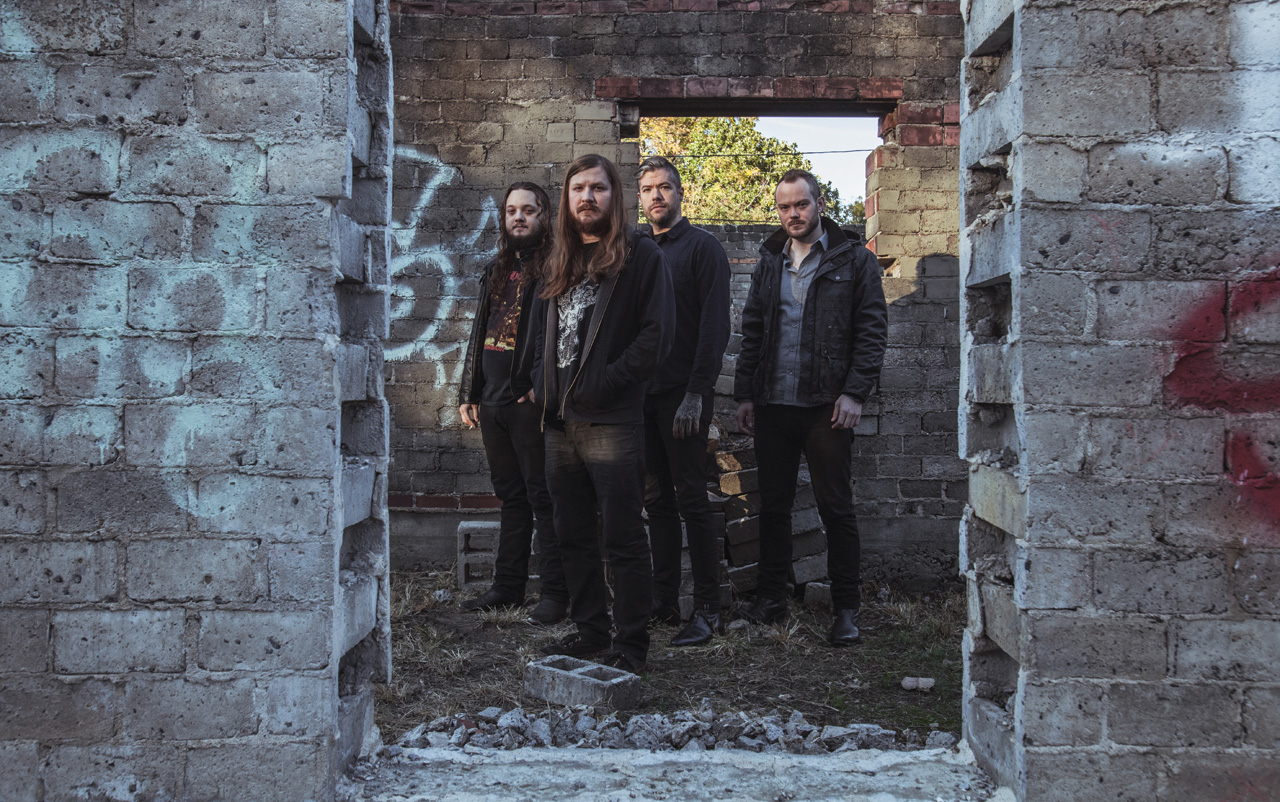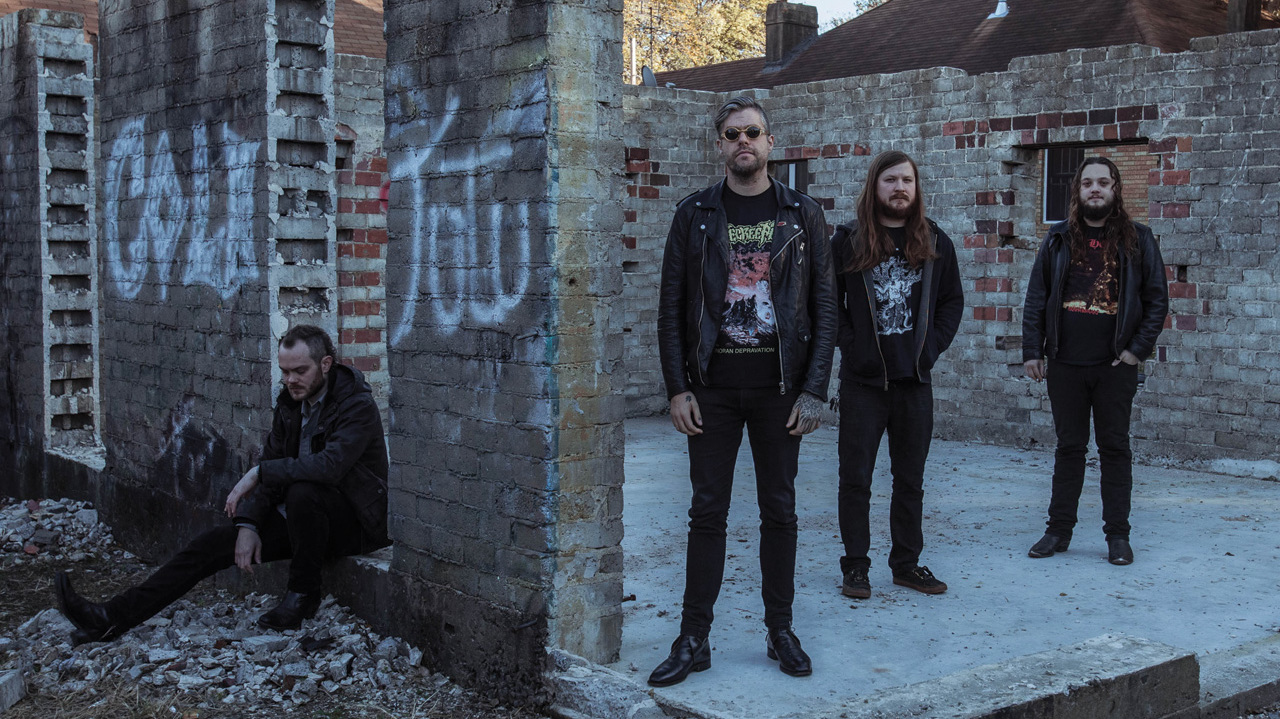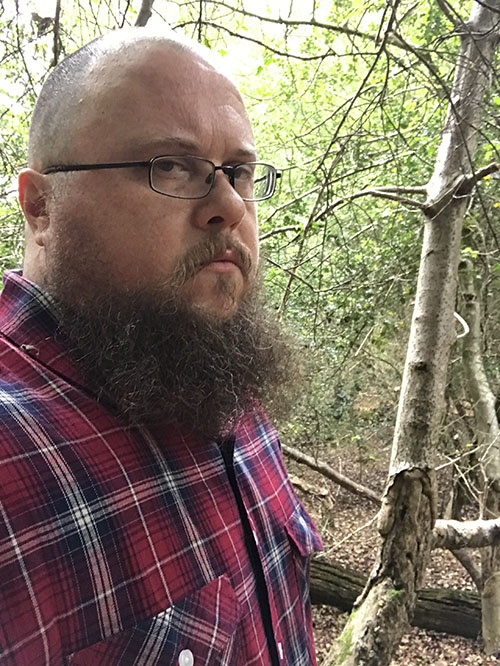“We all know how important this band is to all of us,” emphasises Brett Campbell, the singer/guitarist who co-founded Pallbearer with bassist buddy Joseph Rowland nearly a decade ago in Little Rock, Arkansas, as he accounts for the creative chemistry that’s propelled them way beyond the traditional boundaries of the doom metal scene. Unusually, in an age when bands can spend over a decade gradually rising from underground anonymity to command the world’s attention, impact was immediate; from their ecstatically received 2012 debut Sorrow And Extinction, Pallbearer swiftly became the hottest name to drop across a wide spectrum of listeners and cultures. And the force that drives and unifies the men behind this rare story is an all-consuming passion for making music.
“We all really care about it, trust each other and work really well together,” adds Brett. “We’re all good friends outside of the band, which isn’t always the case. We’re like family; we may bicker here and there but we get along pretty astoundingly.”
Pallbearer’s harmonious refinement has found its strongest manifestation yet on third album Heartless, confirming their ascent from orthodox slow’n’low mastery to a brighter, more expansive and progressive level of compositional achievement and emotional weight.
“We’ve never felt limited by the fact that we’re a doom metal band,” explains Brett, reflecting on the success that he never imagined possible. “We have very wide tastes, even if you can’t hear it on the surface. We’ve always tried to write really great songs, and the benchmarks we set ourselves are the classics. When we make an album, I’m thinking, ‘We need to make Dark Side Of The Moon’, where each song is excellent on its own, and together create this one piece that flows perfectly. Obviously we haven’t made anything as good as that, but still, that’s the goal. We try to make songs that can be universally appreciated, but without making any compromises.”
Although Brett is happy to gush about the inspirations that form the backbone of Pallbearer’s doom (“My Dying Bride, early-to-mid-period Anathema, Paradise Lost, some American sludge, and While Heaven Wept is a big one, too”) the importance of their own personality is perpetually uppermost.
“Not copying any other band has been our goal from the beginning. We wanted our own sound,” affirms the frontman. “We’ve scrapped parts that sounded too much like other bands; we’d rather create a new template. We never wanted to be a ‘riff band’, we wanted to write movements: epic, symphonic arrangements for doom-style songs.”
That crypto-symphonic urge has gradually asserted itself on Pallbearer’s sound, emerging most convincingly among the sublime grooves of Heartless: “A lot of our melodies are inspired by the feeling from old progressive rock, particularly Camel,” says Brett. “Those leads are so beautiful and clear and emotional, we’ve always tried to have that kind of thread through our stuff from the beginning. Progressive rock has been my favourite music since I was a teenager, but we all enjoy that sonic density that doom has, plus I feel doom is a good language to musically explain the circumstances of the world around us.”

Certainly just glancing at the songtitles – Heartless, Cruel Road, Dancing In Madness, A Plea For Understanding – it feels like this album has captured the current global mood. How much has it been shaped by recent world events?
“It was definitely an influence,” admits Brett, his voice darkening. “Everything was written before the election finished, but the dark clouds were on the horizon. I was as surprised as everyone when Trump won, but the narrative around his campaign was one of such hate, and a lot of the stuff we’re hearing is still this dehumanising close-mindedness and unwillingness to open a dialogue. It was frustrating to watch that come about, it’s not healthy. Some lyrics are directly inspired by that, but it’s not specific; it’s about the pitfalls that we keep leading ourselves into out of human nature. This isn’t the first time this sort of thing has happened, and I hope it’s not the last; I hope we survive to fuck up again. If we manage to get these guys out before they really screw everything up, this might be the kick in the ass we need. People are being way more active, hopefully that won’t just wear off. It’s so scary, man, the whole situation is terrifying. I’ve been a wreck. I’m fairly sensitive – I guess that’s clear through our output! – but I really care for the direction our species is going in, and seeing this kind of shit happen I’ve been so highly strung, listening to d-beat and getting really aggro, ready to fuck up some Nazis!”
Although Arkansas is Trump country, Little Rock is a plucky Democratic enclave in this overwhelmingly Republican state. This alone might afford the band a measure of pride in their locality, but it runs far deeper than voting trends. Asked what impact their home town has had on Pallbearer, Brett is unequivocal: “I didn’t used to think it had much effect, but over time I realised it does, more than we ever knew,” he says. “The music scene absolutely played a huge part in making us what we are, the bands we grew up watching had an effect on our outlook. When I discovered there was an active scene in Little Rock and started going to shows, I felt this acceptance into the fold. It was a very small audience but very tight-knit and rabidly supportive. As a kid from some conservative nowhere suburb it was inspiring, it made me realise I can do this, it is possible to make interesting music in central Arkansas, despite the dearth of art in the local area.”
As soon as that connection was made, Brett immersed himself in the city’s creative lifeblood, where he met soul brother and musical foil, Joe. They played together for three years before forming Pallbearer, learning chops, paying dues and pushing envelopes.
“Literally from the moment we met we had a musical rapport,” recalls Brett fondly. “It was him and I and two other guys jamming in a warehouse, and the others weren’t into what we were doing at all, but we immediately had this dialogue going on. We started this weird, freeform, Tangerine Dream-with-guitars sort of thing, completely experimental. Our goal was to be the opposite of what Sunn O))) were doing; we had the drone, but we wanted to constantly move the song forward, introduce new sounds, make it organic and moving – that urge translated to Pallbearer, I think. But that band became kind of a pain in the ass because we had, like, 14 amp heads between three people! So we were looking to do something less back-breaking. And we were going through very difficult periods in our lives for different reasons, so creating mournful music felt natural. There was that tradition in Little Rock of sludge and doom, but it was also great catharsis for what we were going through at the time.”
Pallbearer’s first dream was simply to play in Europe. That dream came true in rare and astonishing style when they took the main stage at Roadburn 2013 in the middle of the afternoon, to an utterly rammed 2,000-capacity crowd. They’re back touring Europe in April, now a far more road-hardened, self-assured unit than the nervous newcomers of four years ago. That well-earned confidence is evident when Brett is asked if Pallbearer can continue raising the bar.
“I’ve never been nervous about that,” he affirms. “We all want to release a better album than our last album every time. We have very high standards, and if we meet our own I assume they’ll meet everyone else’s.”
HEARTLESS IS OUT ON MARCH 24 VIA NUCLEAR BLAST. PALLBEARER TOUR THE UK FROM APRIL 6-9
Little rock, big heart
Brett Campbell toasts the cream of the hometown scene
RWAKE
“I got to see Rwake twice a month – they were incredible! They created this atmosphere that I’ve still never seen in any other band, this very heavy, jarring, harsh, weird kind of psychedelia. I met their guitarist, Kiffin, we became friends and kinda started a band. It was really cool to find these other outsiders doing this amazing stuff here.”
DEADBIRD
“Deadbird are one of the most soulful doom bands I have ever seen. I didn’t know them personally, they were a bit older than me; I had just turned 17 years old when I started going to shows –I was this weird kid from the suburbs, so a lot of the crazy shit that they were getting into was pretty alien to me at the time!”
SHITFIRE
“I need to get these guys to put their stuff online – nobody’s really heard them outside of town. Their riffing style was enormously influential on us – they could probably sue! They were incredible, and really popular around here. Two of the Shitfire guys ran the metal club that was the meeting place for all local degenerates who played metal!”

